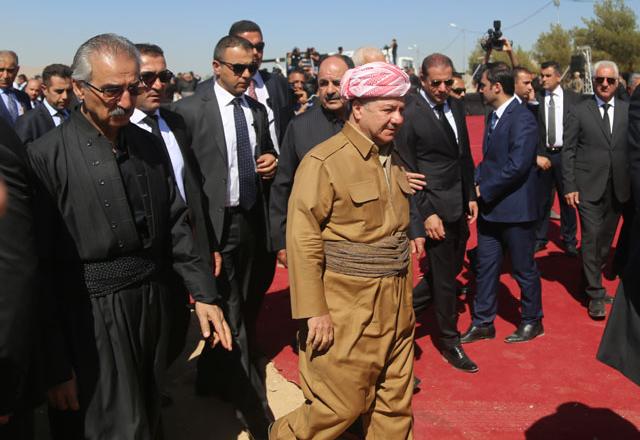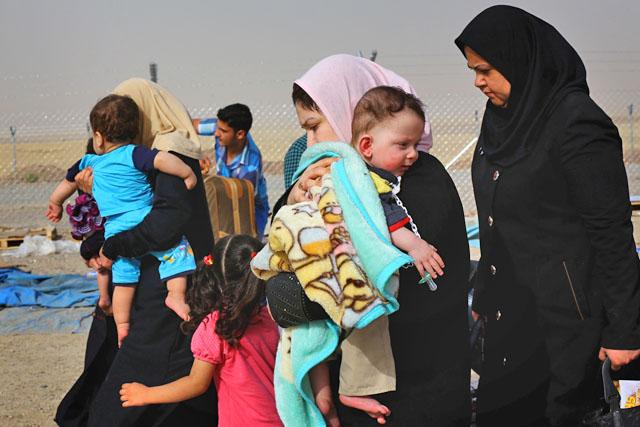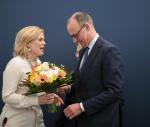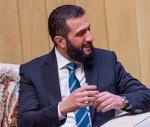You are here
Kirkuk residents anxious as Iraq forces, Kurds mobilise
By AFP - Oct 14,2017 - Last updated at Oct 14,2017

Kurdish Regional Government President Masoud Barzani speaks to media as he visits the grave of former Iraqi president and Iraqi Kurdistan Patriotic Union leader Jalal Talabani in Suleymaniyah, Iraq, on October 7 (Anadolu Agency photo)
KIRKUK, Iraq — A rush of anxiety is spreading across Kirkuk city where residents fear a showdown between Kurdish fighters and Iraqi troops who are massing in the surrounding disputed oil province.
Some residents queued at petrol stations with jerry cans to fill up, while other civilians have begun taking up arms.
For baker Metin Hassan, there was no point taking any chances.
"I closed the bakery today because I'm afraid that a military conflict will erupt and that the Iraqi people will pay the price," Hassan told AFP.
Authorities insist the situation is under control in the ethnically divided but Kurdish-majority northern city, where control is disputed between the Kurds and the central government in Baghdad.
"The security situation is stable and there have been no incidents so far," said police chief, General Khattab Aref of Kirkuk city, home to more than a million Kurds, Arabs and Turkmen.
Tensions in Kirkuk have been running high ever since the governor, Najm Eddine Karim, decided to let a referendum on Kurdish independence take place across the province, also called Kirkuk.
The non-binding vote was held on September 25 in defiance of warnings from Baghdad, which had vowed to take all "necessary measures" to protect the country's unity.
Polling was held in the three provinces that have long formed an autonomous Kurdish region as well as several other Kurdish-held areas, including Kirkuk.
On Friday, as the Iraqi army launched an operation to retake Kurdish-held positions around Kirkuk, some civilians took up arms and deployed on the streets.
One of them, Khasro Abdallah, vowed "to defend Kirkuk to the death".
"We are ready to fight alongside the peshmerga," he said of the Kurdish fighters.
"We will not allow anyone to attack [Kirkuk]," Arass Faqih, another civilian holding a Kalashnikov assault rifle, told AFP.
A senior Kurdish official said thousands of heavily armed peshmerga fighters had been deployed to resist the Iraqi offensive "at any cost".
Strategic prize
Kirkuk is one of several regions that peshmerga fighters took over from the Iraqi army in 2014 when jihadists from the Daesh terror group swept through much of northern and
western Iraq.
Since then, the Iraqi army and the peshmerga have been key allies of the US-led coalition in its fight against the Daesh group.
An Iraqi general said on Friday that troops were advancing to retake positions occupied by the peshmerga in June 2014, and had already retaken a base west of Kirkuk after the Kurdish fighters withdrew.
Another officer, who also spoke on condition of anonymity, stressed the army had no intentions to enter Kirkuk, and that there were no confrontations outside the city.
The peshmerga's Kirkuk commander, Jaafar Sheikh Mustafa, said his forces had withdrawn from areas they had recently entered during fighting against Daesh in the west of the province.
But he warned: "If the Iraqi army advances, we will fight."
Rassoul Omar, another peshmerga general, said his fighters were mobilising south of Kirkuk.
Around the city, Iraqi forces in armoured vehicles and tanks were taking position near the highway leading to Tikrit, southwest of Kirkuk.
Some troops were busy daubing paint on cement blocks which had been stamped with the Kurdish flags.
Southern Kirkuk is a strategic prize for both the Kurds and the federal government as it holds coveted oil fields.
In 2014 "the peshmerga prevented Daesh from attacking the oil infrastructure... and protected the residents of Kirkuk," said commander Sheikh Mustafa.
According to Kirkuk Governor Najm Eddine Karim, high-ranking peshmerga commanders are on the ground "ready to defend Kirkuk".
"Baghdad would do better to find another way to resolve the problems than send troops," he said.
"A war is in no one's interest," added Karim, who was sacked by Baghdad as governor when he decided that Kirkuk would take part in the independence vote.
Related Articles
A major offensive by jihadists is allowing Iraqi Kurds to take control of disputed territory that Baghdad has long opposed them adding to their autonomous northern region.
BAGHDAD — Iraq and Turkey on Thursday stepped up the pressure on Iraqi Kurdistan over its planned independence referendum, as the governor o
KIRKUK, Iraq — The council in Kirkuk, an ethnically mixed region of northern Iraq under Baghdad's control, voted on Tuesday to take part in

















